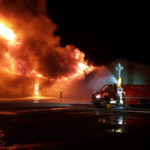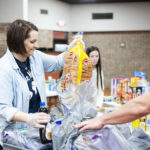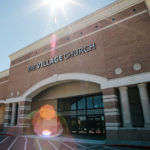Gary Morgan isn’t quite ready to ride off into the sunset yet.

But when he reaches the end of the trail as pastor of Texas Baptists’ flagship cowboy church next year, he’s glad to know his congregation will be in good hands.
The Cowboy Church of Ellis County was among the first western-heritage congregations affiliated with the Baptist General Convention of Texas. For several years, it was the largest cowboy church in North America. Morgan became the congregation’s pastor in May 2001, the year after its founding.
From the start, the church appealed not only to cowboys who compete in rodeo events or who work with horses and cattle for a living, but also anyone who identifies with cowboy culture.
“We welcome people from every walk of life, but our church has always particularly drawn blue-collar working people—country folks who felt left behind by traditional churches” when those congregations became more affluent and sophisticated, Morgan said.
Regularly scheduled “buck-out” events and team-roping competitions, along with a big annual full-scale rodeo, attract people who identify with cowboy culture.
The casual atmosphere at worship services—a country band leading music and most people wearing boots, jeans and cowboy hats—also helps people who relate to the western heritage feel at home.
Not always understood
The cowboy church movement was not always understood or appreciated by traditional churches in its early years, Morgan acknowledged.
“Some people misrepresented us as the ‘beer and barbecue church,’” he said.
Sign up for our weekly edition and get all our headlines in your inbox on Thursdays
For the record, that description never accurately described the Ellis County church’s means of attracting people—at least, not the part about beer.
However, Morgan noted, the Cowboy Church of Ellis County—and western-heritage congregations in general—were designed to remove barriers that might have prevented people who “hung out at beer halls and barbecue joints on Saturday night” from feeling welcome in church the next morning.
Through the years, neighboring congregations generally have grown to understand much more about the nature of the cowboy church, he observed.
“I believe we’re perceived in the community now as a seriously biblical church and a strong Bible-preaching church,” he said.
‘Chasing a boulder rolling down a mountain’

The Cowboy Church of Ellis County—and the western-heritage church movement—experienced explosive growth during the early years of Morgan’s pastorate in Waxahachie.
“My experience in ministry up to that point had been like pushing a boulder up a mountain. Those first few years here (at the Cowboy Church of Ellis County) were more like chasing a boulder rolling down a mountain. The challenge was just keeping up with what God was doing,” Morgan said.
More than 200 cowboy churches currently are affiliated with the Baptist General Convention of Texas, said Jason Bryant, Texas Baptists’ western heritage consultant and church starter. Since 2000, Texas Baptists have invested more than $6.2 million in Cooperative Program funds to help churches start 193 cowboy churches.
The peak years for Texas Baptists’ efforts in starting western-heritage churches were around 2007 to 2010, when they averaged 12 to 15 new church starts per year. In 2019, the last year before the COVID pandemic, they started four.
With little more than half of the BGCT-affiliated cowboy churches reporting, those congregations drew more than 18,000 in Sunday worship attendance and baptized 1,264 new Christians in 2021, Bryant said.
Since 2000, Texas Baptists’ western-heritage churches have reported more than 22,500 baptisms, he added.
The Cowboy Church of Ellis County was averaging about 1,500 per week in worship before the pandemic and consistently baptized significant numbers of new believers. Post-pandemic, the church is drawing about 1,000 for in-person worship.
“We’re starting to see lots of new faces again—12 to 15 people visiting most Sundays,” Morgan said.
Need to develop disciples
However, several years ago, Morgan and other cowboy church pastors discovered a troubling gap between drawing a crowd on Sunday and retaining newcomers long enough to see them develop into mature disciples of Christ.
“We were doing a good job of bringing a lot of people in the front door, but we were losing them out the back door,” he said. “We started doing some soul searching. We realized in the beginning, we were more intentional about building churches than in growing Christians. And that bit us.”
Recognizing they needed to do a better job of integrating newcomers into the life of the congregation and developing them into mature followers of Jesus, Morgan and other cowboy church pastors came to realize “traditional churches were doing some things for a good reason.”
In particular, they recognized the need to involve worshippers in small-group Bible studies devoted to discipleship and relationship-building with mature Christians.
“People need community with other believers. They need to know their meaning and purpose. They need to find their place of service in the church and in the broader kingdom of God,” Morgan said.
So, Morgan helped the national American Fellowship of Cowboy Churches develop a discipleship curriculum suited to western-heritage churches.
“Without a doubt, you have to get people in the doors of the church,” he said. “But we have to be intentional about starting them on a path of discipleship.”
Making changes, preparing for transition
In addition to a renewed emphasis on discipleship, Morgan said, the Cowboy Church of Ellis County also had to modify its philosophy about paid staff.
“In the beginning, we tried to do nearly everything with volunteers,” he said. “We still believe volunteers are the backbone of the church, but there came a point where being the only paid minister on the staff just about ate my sack lunch.”

While the Ellis County church still has a relatively small staff for a church its size, it has added several ministers to serve alongside Morgan.
With his retirement planned next year, Morgan and the church’s elected elders developed a transition plan for leadership. Chris Maddox, the church’s executive pastor, will become lead pastor when Morgan retires.
“It’s good to know there are young bucks in the chute, ready to go. It’s time to hand the reins over to them,” Morgan said.
When he retires, Morgan and his wife Donna plan to spend more time with their three grown children and two grandchildren. Beyond that, they will pray about where and how God wants to use them in their next chapter of life.
“A lot of preachers work for a lifetime and don’t experience a genuine movement of God,” Morgan said. “I’ve had the chance to see God do something new and genuine.
“It’s been a good ride.”
This article originally appeared in CommonCall magazine.














We seek to connect God’s story and God’s people around the world. To learn more about God’s story, click here.
Send comments and feedback to Eric Black, our editor. For comments to be published, please specify “letter to the editor.” Maximum length for publication is 300 words.